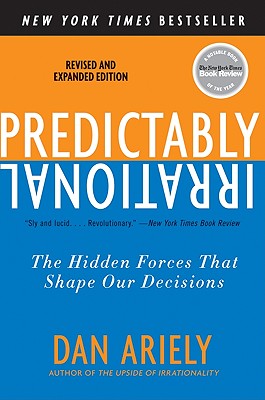Jack Covert Selects - The Honest Truth about Dishonesty
June 14, 2012
The Honest Truth about Dishonesty: How We Lie to Everyone—Especially Ourselves by Dan Ariely, Harper, 304 pages, $26. 99, Hardcover, June 2012, ISBN 9780062183590 If Dan Ariely’s new book is anything like his last two, it will sell like gangbusters and enlighten a lot of people on a matter of the mind we take for granted, or don’t even stop to consider. And the book, The Honest Truth about Dishonesty, comes at a time when we can use some pause and reflection.

If Dan Ariely's new book is anything like his last two, it will sell like gangbusters and enlighten a lot of people on a matter of the mind we take for granted, or don't even stop to consider. And the book, The Honest Truth about Dishonesty, comes at a time when we can use some pause and reflection.
The seemingly never ending series of corporate scandals and financial chicanery (Ariely begins the book by considering Enron) and the complete inability to clean it up or stop them from occurring, makes the question at the heart of the book, "is dishonesty largely restricted to a few bad apples, or is it a more common problem?" a very important one for both the business community.
Ariely, through both reasoning and research, rejects the long-accepted Simple Model of Rational Crime (SMORC), that "in weighing the costs versus the benefits, there was no place for considerations of right or wrong; it was simply about the comparison of possible positive and negative outcomes," and the book's central thesis replaces it with a more nuanced and human explanation of dishonesty:
[M]uch of our behavior is driven by two opposing motivations. On one hand, we want to view ourselves as honest, honorable people ... (psychologists call this ego motivation). On the other hand, we want to benefit from cheating and get as much money as possible (this is the standard financial motivation). Clearly these two motivations are in conflict.The Honest Truth about Dishonesty explores different territory than his previous books, Predictably Irrational and The Upside of Irrationality, but if you've read those previous works you'll be pleased to know that it continues and moves forward the general arc of those studies.
Beyond exploring the topic of dishonesty, this book is fundamentally about rationality and irrationality. And although dishonesty is fascinating and important in its own right, it is also important to keep in mind that it is but a single component of our interesting and intricate human nature.And he believes we can create an environment that fosters optimal behavior:
Once we more clearly understand the forces that really drive us, we discover that we are not helpless in the face of our human follies (dishonesty included), that we can restructure our environment, and that by doing so we can achieve better behaviors and outcomes.To understand what keeps businesses honest and profitable, it is important to understand what keeps the people within them honest, and to put appropriate systems in place. It is not about becoming a nanny or absolving individuals of responsibility, but of simply understanding human nature, and putting the better angels of our nature to work within our organizations and societies.



